Key takeaways:
- Code reviews foster collaboration and shared knowledge, leading to improved code quality and team relationships.
- Effective communication tools, like GitHub and Crucible, streamline the review process, enhancing clarity and teamwork.
- A structured code review process can face challenges such as resistance, feedback inconsistency, and time constraints, but overcoming these can elevate team skills and morale.
- Enhanced collaboration positively impacts code quality and project timelines, demonstrating the importance of diverse perspectives in coding practices.
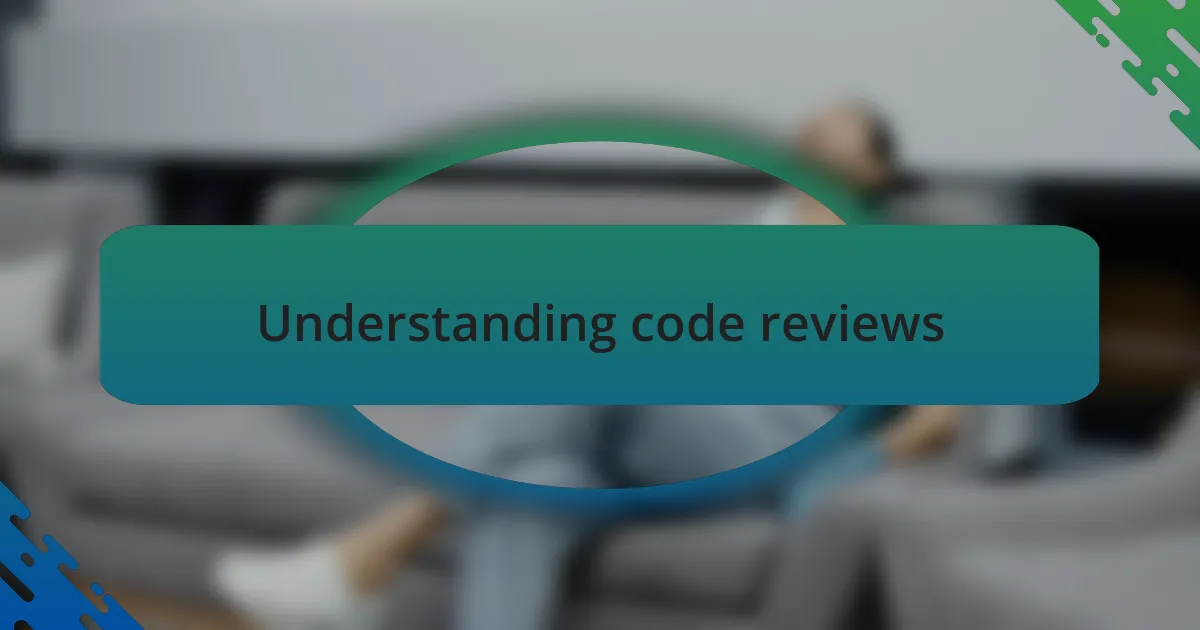
Understanding code reviews
Code reviews are a vital component of the software development process, providing an opportunity for team members to share insights and best practices. I remember the first time I participated in a code review; I was a bit anxious about my code being scrutinized, but the feedback I received was incredibly valuable. It made me realize that these reviews are less about criticism and more about collaboration and learning.
When I delve into a colleague’s code, I often find myself discovering new techniques and approaches. Have you ever paused to reflect on how much you can learn from someone else’s perspective? I’ve had moments where a simple suggestion transformed a section of my code, leading to greater efficiency. This exchange not only improves the codebase but fosters a culture of shared knowledge within the team.
Moreover, code reviews can act as a safety net for catching potential issues before they escalate. I recall a particular instance where a seemingly minor error was flagged during a review, which, if left unnoticed, could have caused significant complications later in the project. It’s these shared experiences that not only enhance the quality of our work but also build stronger relationships among team members, making our collaborative efforts even more fruitful.
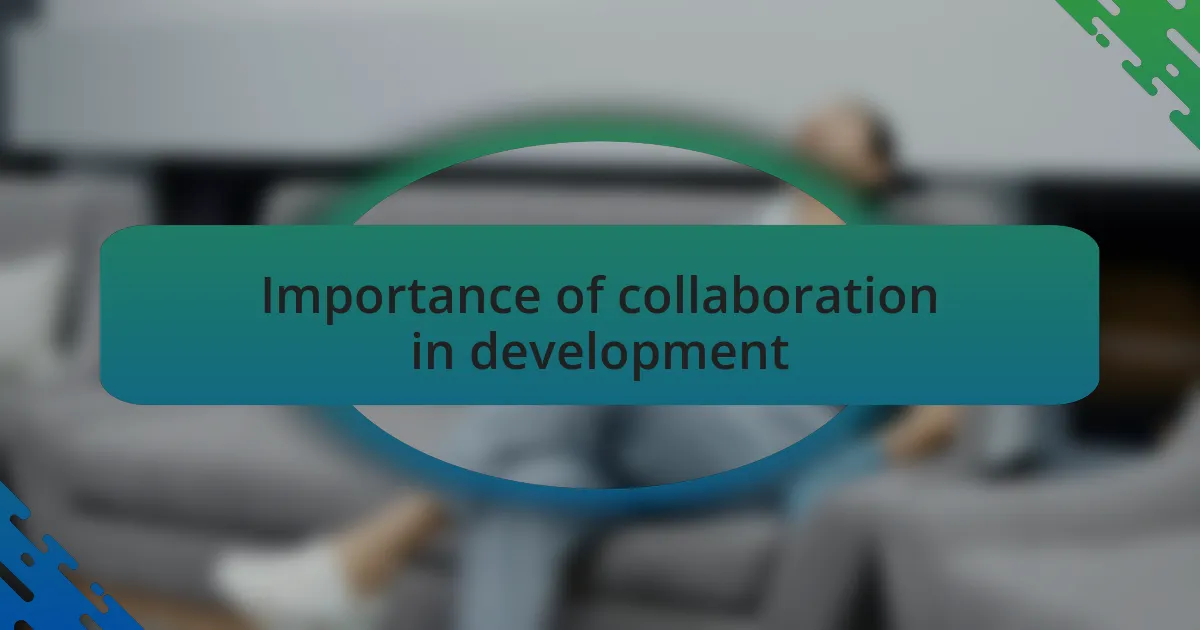
Importance of collaboration in development
Collaboration in development isn’t just beneficial; it’s essential. Reflecting on my experiences, I’ve seen how working together can elevate a project from average to extraordinary. Have you ever tackled a complex problem alone, only to find that discussing it with a colleague brought clarity and innovative solutions? It’s fascinating how a simple conversation can unravel complexity and lead to breakthroughs.
Additionally, the social aspect of collaboration enhances team dynamics. I’ve often felt a sense of camaraderie when we collectively brainstormed solutions during a challenging phase in development. This connection can boost morale and motivate the team to overcome obstacles together. Isn’t it encouraging to know that everyone brings unique strengths to the table, making the process not just about the work but also about building relationships?
One of the most underrated aspects of collaboration is the synthesis of diverse viewpoints. For instance, during a project, I witnessed a junior developer propose a solution I hadn’t considered. The fresh perspective not only improved our code but also reminded me that great ideas can come from anywhere. Isn’t that what makes our field exciting—the endless possibilities that arise when we join forces?
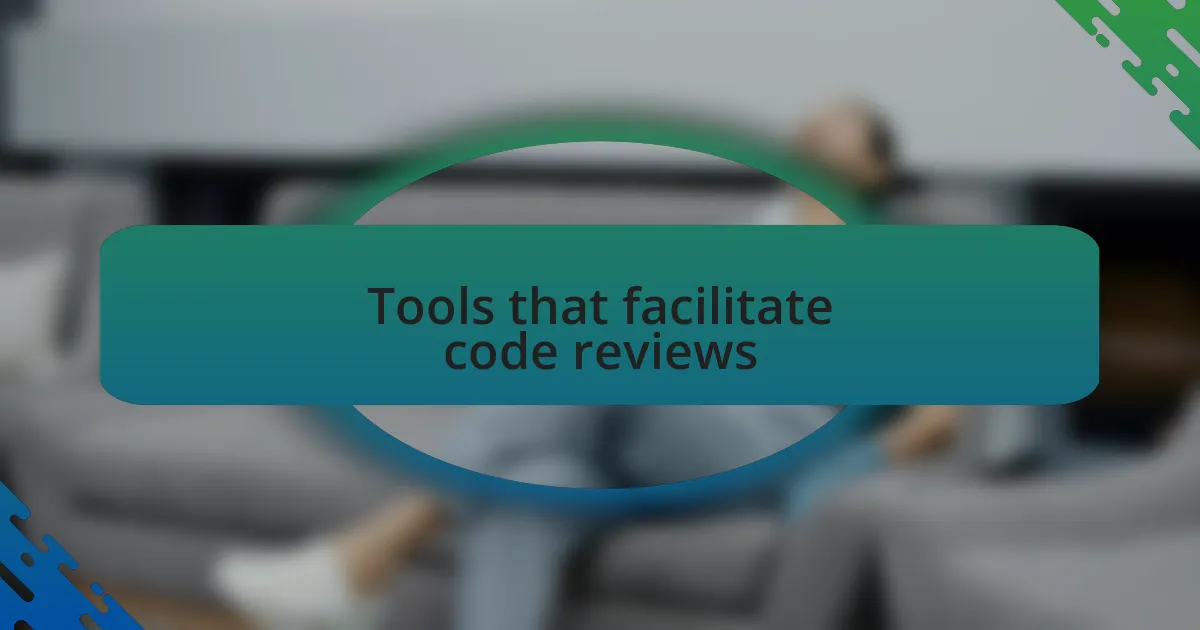
Tools that facilitate code reviews
When it comes to facilitating code reviews, the right tools can make a world of difference. I remember the first time I used GitHub for code reviews; the ease of sharing and commenting directly on lines of code transformed how we communicated. Have you ever found yourself lost in email threads? With GitHub, everything is in one place, making discussions more coherent and streamlined.
Another tool that has significantly influenced my experience is Crucible. This platform not only allows for detailed feedback but also supports integration with other tools we frequently use. I vividly recall a time when a critical bug slipped through during a review. Using Crucible, we quickly identified and addressed the issue with collaborative notes and suggestions. Doesn’t it feel reassuring when the right tools rally the team around a common goal?
Moreover, tools like Review Board are fantastic for assimilation of feedback. I once worked on a project where multiple reviewers provided insights. Review Board’s ability to consolidate these comments into a single view helped us avoid confusion. Have you ever found value in seeing different perspectives laid out clearly? It made the review process not only efficient but also enriched by the diversity of thoughts, highlighting the power of collective knowledge in improving our code.
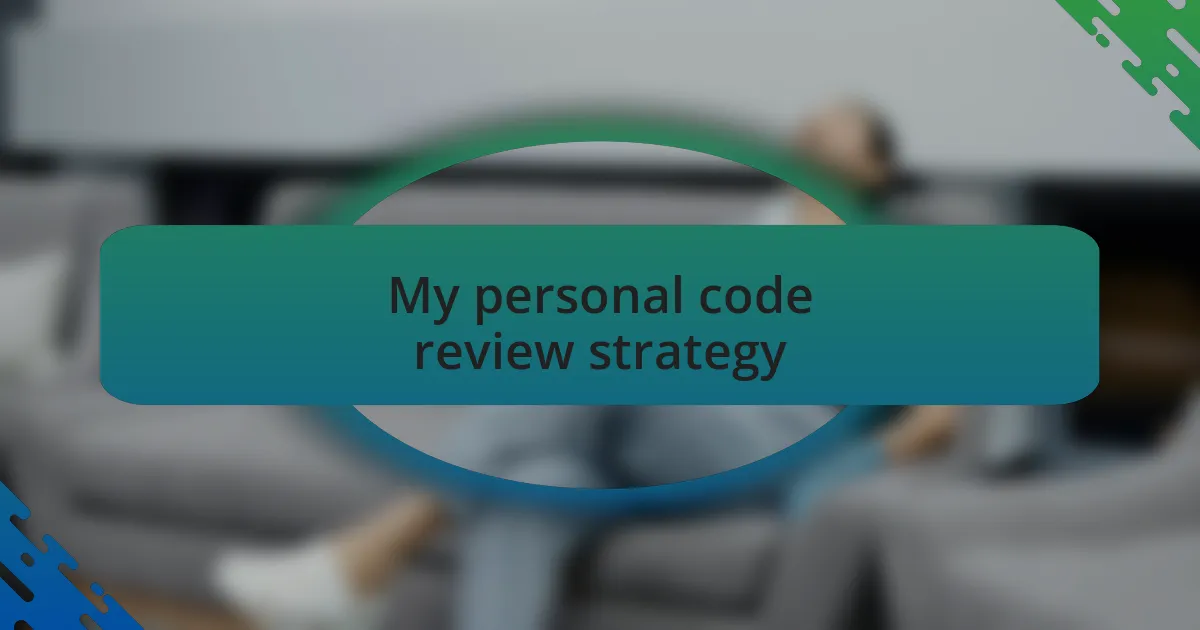
My personal code review strategy
My approach to code reviews involves three key principles: clarity, context, and collaboration. When I review code, I strive to understand not just what the code does, but why it was written that way. I recall a time when I reviewed a colleague’s function that seemed overly complex. By asking about the purpose behind it, we discovered a more straightforward approach, which not only improved the code but also led to a productive discussion on best practices. Have you ever wondered how a simple question can unlock a wealth of knowledge?
Context is everything in code reviews. I always encourage developers to provide background information on their code changes. One memorable discussion revolved around a feature that required a specific API integration. By sharing the related documentation during the review process, the team quickly aligned on the goals and implications of the new feature. Isn’t it incredible how a little context can turn a confusing patch into a learning opportunity for everyone involved?
Collaboration is at the heart of my strategy. I make it a point to create an open atmosphere where everyone feels comfortable sharing their thoughts. During one project, we hosted a review session where developers could present their changes in real-time. This not only fostered team bonding but also led to quick resolutions of misunderstandings. Do you favor open dialogues during code reviews? I find that they yield better outcomes than isolated comments on a screen.
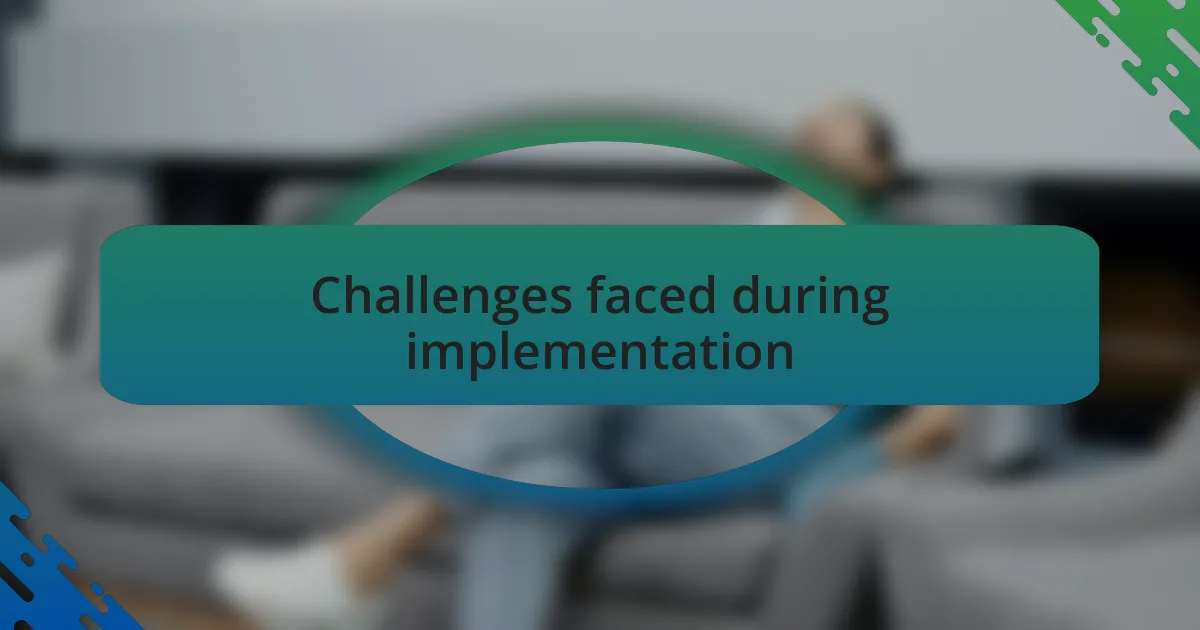
Challenges faced during implementation
Implementing a structured code review process often comes with its share of hurdles. For instance, I once faced resistance from a colleague who felt that peer reviews were unnecessary, believing his code was clear enough. It prompted me to suggest a trial period where we documented the outcomes. Not only did it lead to improved quality, but it also encouraged him to appreciate diverse perspectives. Have you ever experienced pushback when trying to implement a new process?
Another challenge I encountered was the inconsistency in feedback quality among team members. During one project, I noticed that reviews varied greatly in depth and helpfulness. To address this, I initiated a buddy system for reviews, enabling less experienced developers to learn from those with more experience. It fostered an environment of shared knowledge. Isn’t it fascinating how pairing up can elevate the collective skill level?
Time constraints also played a significant role in how thoroughly code reviews were conducted. There were moments when urgency overshadowed the need for thoughtful feedback. I vividly recall a sprint where deadlines pushed us to rush through reviews, leading to overlooked bugs. It was a valuable lesson in prioritizing quality over speed. How do you balance deadlines with the need for careful review? This balance remains a continual discussion within our team.
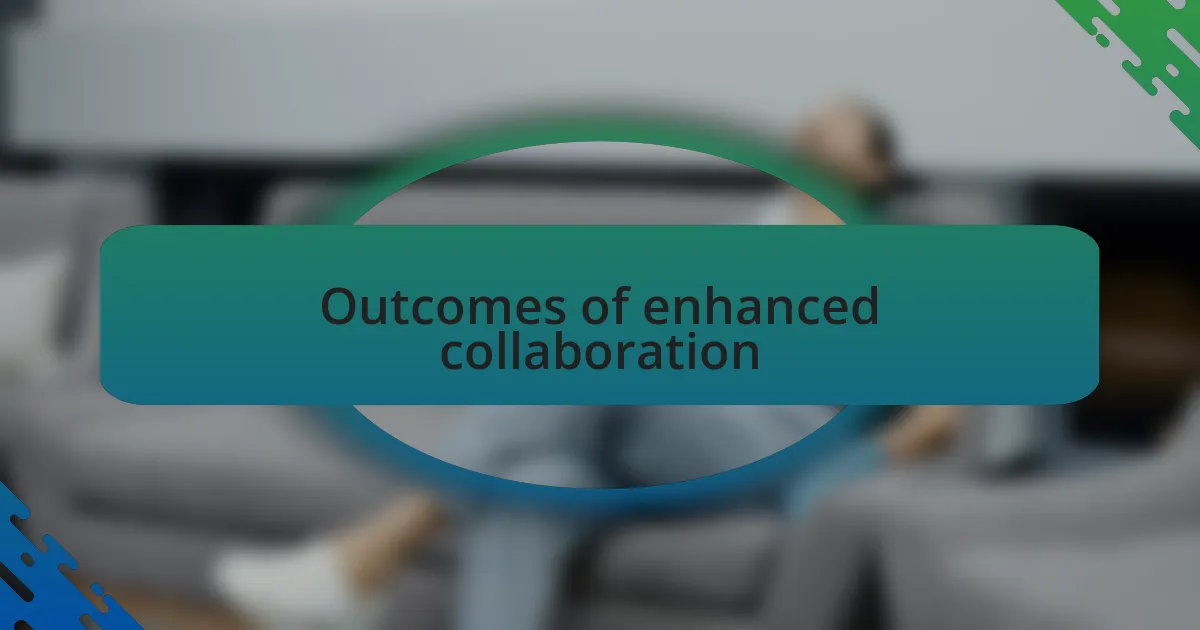
Outcomes of enhanced collaboration
The outcomes of enhanced collaboration through code reviews can be transformative. I remember a time when a colleague pointed out a simple, yet critical, design flaw in my code that I had completely overlooked. The moment he highlighted it, I realized how such collaborations could prevent potential pitfalls down the line. Isn’t it incredible how one fresh pair of eyes can protect us from errors we might have missed?
As we integrated more structured reviews, our team culture shifted noticeably. I found that trust and camaraderie began to bloom; everyone felt more comfortable voicing their thoughts without fear of judgment. There was a palpable sense of unity in tackling problems together. Did you ever feel that boost in morale when collaboration makes the whole team stronger?
Additionally, I noticed marked improvements in code quality and speed of release. By including diverse perspectives in our reviews, we not only enhanced the quality of our code but also managed to accelerate our project timelines. Once, a cycle that typically took us weeks to finalize was wrapped up in days because we caught issues early in the process. How often do you get to celebrate such efficiency while maintaining quality? Those moments are worth every effort we put into collaboration.